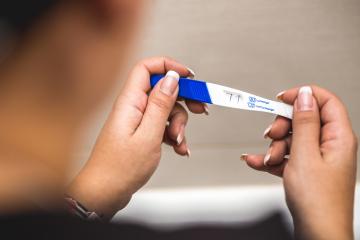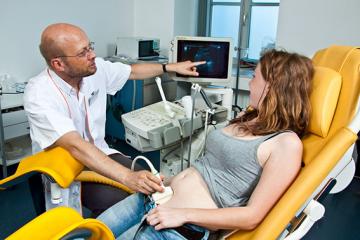Sometimes women already suspect they might be pregnant because they didn’t use any contraception when they last had sex, or the condom broke. Most of the time however, it’s a surprise when their period doesn’t come—usually the first sign of pregnancy. Some women experience typical morning sickness, tenderness in their breasts, or cramping in the lower abdomen, or they simply feel exhausted and tired.
Some women don’t feel any changes in their body. An irregular cycle is normal for many or may be caused by stress or other life circumstances or conditions. Therefore, they don’t worry if menstruation is late.
Occasionally, a woman can experience light bleeding around the time of her expected period, even though she is already pregnant. This is caused by implantation of the fertilised egg in the uterus and is frequently confused with menstruation.
The physical signs are very different from one woman to another and are not a reliable indication of pregnancy. Only a pregnancy test provides a reliable result.
Pregnancy test

Urine tests that can diagnose pregnancy early (in the first few weeks) are available in any drugstore or pharmacy (for around 14€). You can perform them easily at home.
Doctors, clinics, and women’s health centres also offer these tests.
The tests diagnose the hormone hCG (human Choriongonadotropin) in urine. This hormone is produced only during pregnancy and can be reliably identified in the body as early as 12 days after fertilisation.
If the test is negative, you are either not pregnant or it is too early to take the test. You should repeat the test 3-4 days later to be sure.
If there is any doubt, you can also go to a laboratory to measure the amount of pregnancy hormone in your blood.
In any case, it is important to continue using contraception.
Ultrasound examination

However, an ultrasound examination can only be done from the 6th week onwards, when the embryo and gestational sac become large enough to be visible. A urine test is more reliable in very early pregnancy



